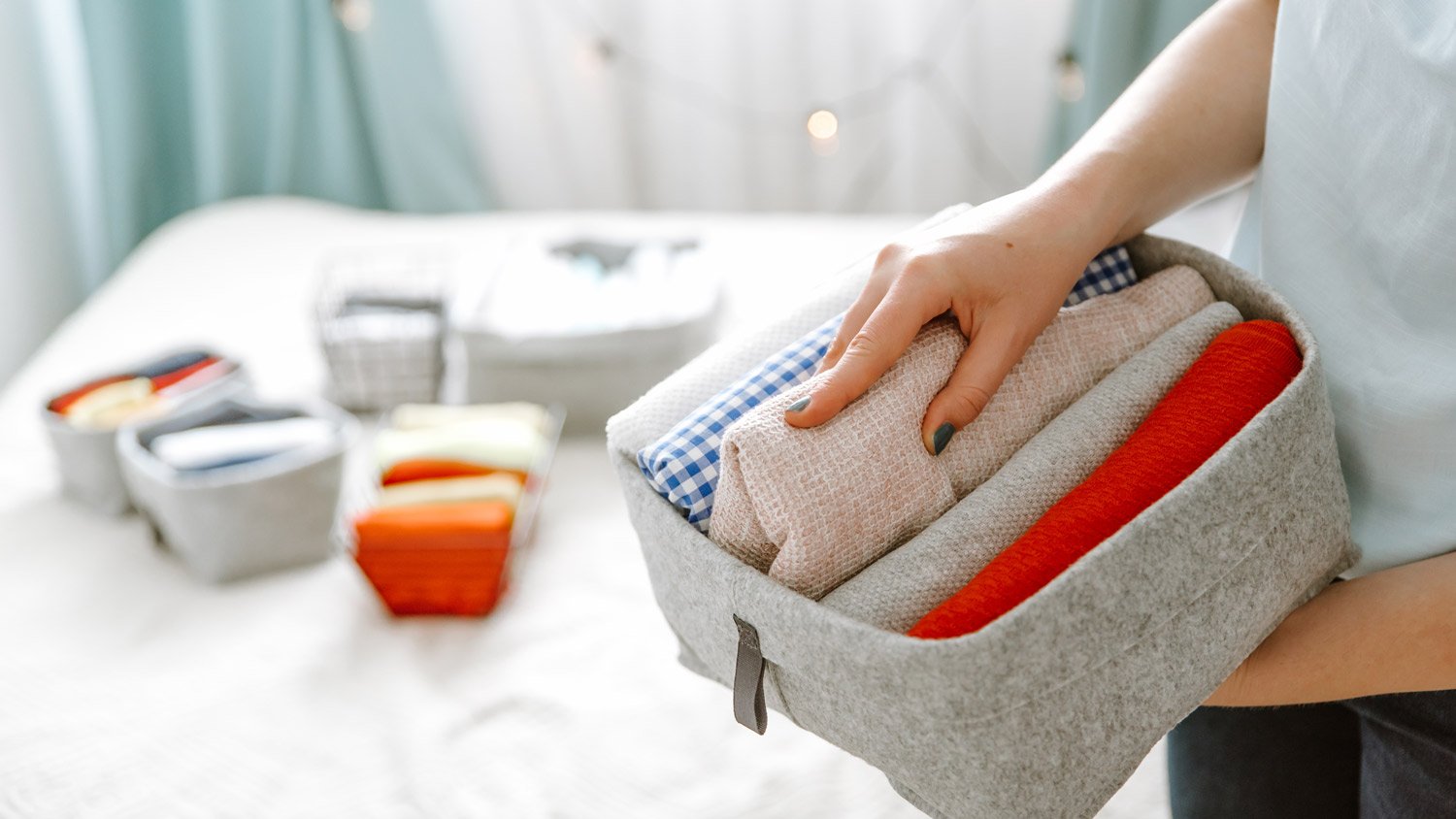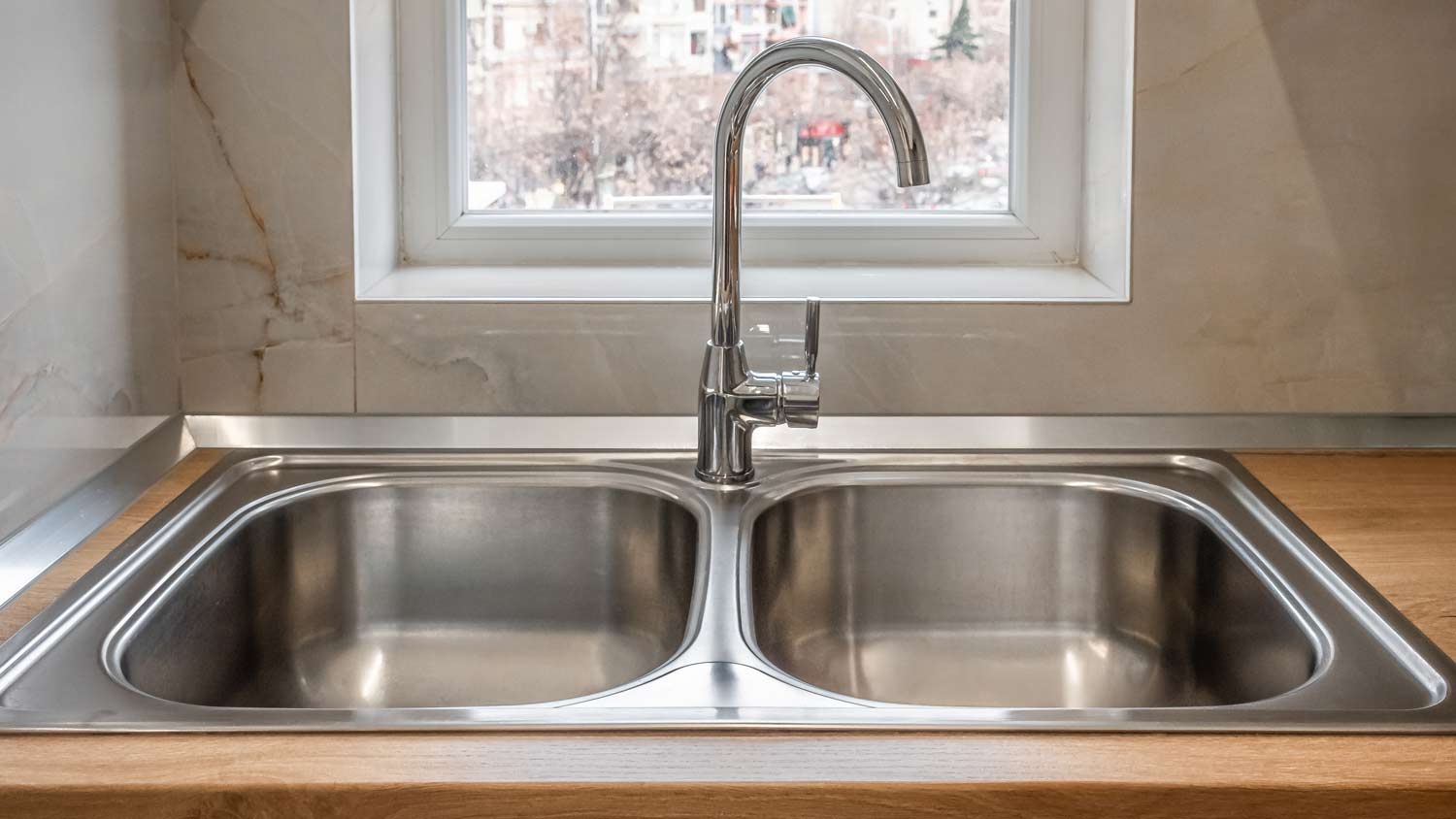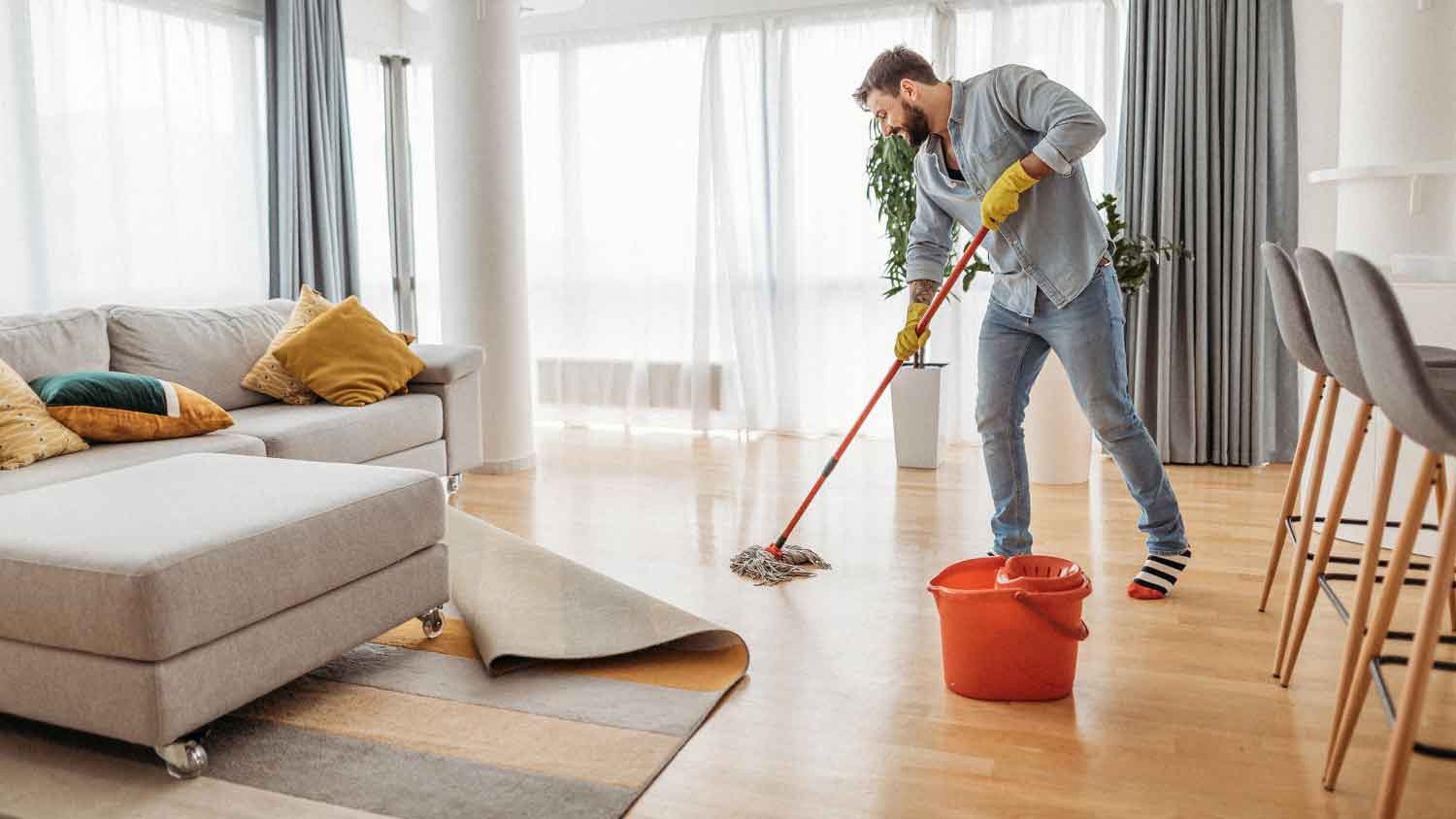17 Ways to Make Your Closet Smell Amazing
Make stepping into your closet feel like a breath of fresh air—literally


Keeping clothes in closets smelling good involves making sure the clothes going in are as clean as possible, and there is enough air flowing through spaces. Whether it’s keeping closets clean and organized or using essential oils and a dehumidifier, it’s possible to keep odors and musty smells at bay. Here are 17 ways to keep the scents in closets smelling pleasant and great.
Why Clothes Smell
The reasons a closet sometimes smells musty or stale is due to moisture and stagnant air. It’s common to think that to make a closet smell good, you need to include pleasant-smelling items like lavender sachets or spritz some perfume. While doing those things will mask nasty odors, they’re more of a quick fix rather than a long-term solution. To make a closet smell good, think about what you’re putting into your closets that are creating any odors and how you can keep the air flowing.
Mold and mildew are also common causes of a smelly closet. Similar to when you take a whiff of an old bath towel, and it just smells off, clothes in your closet may have a musty, earthy smell. Closets likely don’t have windows, creating a warm, moist, and dark environment for mold and other fungi and bacteria to grow and spread. Before you begin refreshing your closet, inspect for any leaks or causes of moisture.
Similarly, are you tossing your sweaty gym clothes in a pile on the floor of the closet to deal with later? While it’s hard to find the energy to launder sweaty clothes after pumping the iron or running on a treadmill for an hour, clean these damp clothes as soon as possible. Letting them sit around in the closet can only make a closet stench worse.
How Much Does It Cost to Make a Closet Smell Good?
Many of the supplies you need to make a closet smell good cost under $25, and other options, like rotating clothes, are completely free. If you want some professional help to freshen up your clothes, a cleaning service costs about $30 to $50 per hour.
How to Make a Closet Smell Good
It turns out that clothes really do make the man (or person). The clothes we wear influence the way people see us and the way we think. Research shows we make accurate assumptions on someone's personality, politics, and income just from looking at the shoes they wear most often. One way you can put your best foot forward (no pun intended) is by keeping your clothes and closet fresh and clean. Here are 17 ways to make a closet smell good.
1. Store Only Clean Clothes
Having a nice smelling closet actually starts in the laundry room. It’s not unusual to wear a pair of jeans, sweaters or other clothing and throw them back into the closet before washing. However, it’s important to wash clothes properly so your body oils and environmental elements don’t linger in the closet too long.
2. Wash and Dry Exercise Clothes Properly
Washing and drying clothing properly can play a big part in how your closet smells—especially your workout gear. When you’re washing exercise clothes, add a cup of baking soda or white distilled vinegar to your wash to help neutralize odors and make your detergent work better. Don’t throw the exercise clothes in the dryer. Instead, hang them to air dry.
3. Wear Your Clothes

Don’t forget to wear the clothes in your closet. Most of us only wear 20% of our clothes in our closet 80% of the time which means that the gorgeous cashmere sweater you bought on sale may not have seen the light of day in years. Clothes that haven’t been worn and washed can start to smell stale or like mildew. It also allows insects like moths to lay eggs, which then turn into larvae and snack on natural fibers like cashmere, silk, and wool. If you don’t have the occasion to wear something and you can hang the clothes outside for a few hours, the breeze can help dissipate odors. For items you don’t think you’ll wear or want anymore, consider selling or donating them so someone else can enjoy wearing them.
4. Let Your Clothes Breathe
When clothes are bunched up next to each other, air can’t circulate around the fabric so the clothes start smelling musty. Whenever possible, hang clothes instead of folding and stacking them so there is more space between each item. If you must fold and stack, try to keep the stack to a minimum so the items on the bottom have at least a bit of breathing room.
5. Get Organized
Instead of letting things pile up or get lost, organize your closet. Having things in their place allows you to see things easily so you can make the most of your entire wardrobe and prevent your clothes from collecting dust or attracting pests.
6. Ruthlessly Declutter

If you find yourself ducking from falling handbags every time you open the door, it may be worth decluttering or storing items for other seasons in a different space. You don’t need heavy sweaters and boots, for example, in the middle of summer and the bathing suits and summer dresses can go into storage in the winter. It’ll not only free up more space in your closet and allow you to find clothes you can wear right now, but that added room will allow air to circulate around the existing inventory.
7. Add Cedar or Pine
A person whose clothes smell of pine was rated as relatively more successful, intelligent, sociable, sanitary, and attractive than one whose clothes smelled of onion or smoke, according to one study. Adding aromatic closet liners like pine wall panels, cedar closet liners, or even cedar panels to help keep your closet smelling good. Cedar’s natural aroma helps prevent the spread of mold and mildew by removing moisture from the air, which is especially important in humid climates. Pine naturally repels insects, has a pleasant smell, and is generally less expensive than cedar.
8. Bring the Kitchen Into the Closet
OK, maybe not the entire kitchen—but lavender, lemon, and coffee can help neutralize odors. Lemon’s acidity helps neutralize odors. Boil lemon peels to bring out the fragrant acids. Make some lavender sachets and hang them in a closet or place them in drawers to not only keep your closet smelling fresh and clean, but also to help repel moths.
There’s a reason many perfume counters feature little jars of coffee beans: they clear the olfactory palate. Add a small jar in your closet to pick up foul odors.
Spray the interior parts of your closet with equal parts vinegar and water to help deodorize your closet. Finally, baking soda is great for odor absorption, too. Add a few spoonfuls to a jar, just like you would in your refrigerator, and let its moisture-absorbing work do its thing.
9. Hang Eucalyptus Sprigs
Eucalyptus repels bugs like moths and other insects. Its oil is anti-bacterial and anti-fungal, making it a great room deodorizer, especially in closed spaces like closets. Its pleasant and earthy scent makes it a popular, natural, and easy way to keep your closet and clothes smelling good.
10. Get the Air Flowing
Wet and stagnant air is a breeding ground for mold, so getting air flowing through your closet can help keep things fresh. Because most of us don’t have a window in our closets, open the window in the adjoining room to let air flow. If opening a window isn’t an option, a fan will do. Turning on the air conditioner can help, too. If moisture continues to be an issue, consider adding a dehumidifier.
11. Use Dryer Sheets
Sure, you can use dryer sheets while doing laundry to help add some fresh fragrance to your clothes, but you can also stash dryer sheets throughout your closet to eliminate odors. This method is a great way to reduce waste, too, because you can place used dryer sheets that still have a little life left in drawers or the pockets of your jackets and jeans.
12. Try Bar Soap
Nothing smells quite as strongly as a freshly opened pack of bar soap. Luckily, you can use that powerfully fresh smell in your closet. Some soaps can stain or damage clothing, so wrap a strongly scented soap bar in thin fabric and place it in your closet. Leave the soap in the closet for just a few hours and replace unpleasant odors with a nice fragrance.
13. Opt for Essential Oils
Essential oils are concentrated from plants, fruits, and other sources and provide strong scents that can be blended with other essential oils for customized fragrances. You may already have an essential oil diffuser in the bedroom or bathroom, but you can also use these fragrances in the closet.
In large closets, place a small oil diffuser with essential oils.
Soak cotton balls or napkins in essential oils, let them dry, then place them in the closet. Refresh every month.
Place a few drops of essential oils in the washing machine while the clothes are on the final rinse cycle.
Some essential oils repel pests, like lavender, which repels moths. But essential oils are best used in homes without pets. To keep pets safe, avoid essential oils, as even breathing in the scents can be harmful to your furry friends.
14. Drop In Baking Soda
You already know to keep baking soda in the fridge to keep unwanted smells at bay. Luckily, this affordable household staple also works at absorbing odors in closets. Keep a box of baking soda in the closet, ideally in a place out of reach where it won’t be knocked over. You can also put a few tablespoons in a jar, bowl, or another container for about 24 hours to quickly remove funky odors.
15. Try Activated Charcoal
Like baking soda, activated charcoal is an effective odor neutralizer.
Place a block of activated charcoal in the closet.
After about three months, place the block outside in the sunlight for two to three hours to release absorbed odors.
Replace the activated charcoal block in the closet.
Swap out older activated charcoal blocks for a new block about every 18–24 months.
16. Select Some Air Fresheners
Air fresheners are designed to do just that—freshen the air. You can use a spray or a concentrated hanging air freshener to make your closet smell good.
You can also make a homemade spray air freshener by combining one part distilled white vinegar and one part water in a spray bottle, adding 10–12 drops of essential oil. If you’re avoiding essential oils for pet safety, you can add citrus peels, like lemon or orange, into the bottle for a fresh scent.
17. Add a Jar of Coffee Grounds
The nitrogen in coffee can naturally neutralize odors. Place coffee grounds in a bowl or jar in the closet, in a place where they won’t be bumped or spilled. Not only will the grounds absorb bad odors, but they’ll also release the amazing smell of a freshly brewed cup of joe, too. Replace the coffee grounds about once per month to keep your closet smelling fresh.
How to Prevent Closet Odors
Many of the tips for eliminating closet odors and refreshing clothing, like keeping baking soda or activated charcoal on closet shelves, are also key to preventing closet odors long-term. But there are some ways to avoid closet odors if you don’t want to restock coffee grounds in the closet every month or mix your own air fresheners.
Inspect the Closet
Sometimes, the source of an odor is actually a leak or a larger household mold problem. Make sure to inspect the dark corners of the closet, the ceilings, floors, and walls to look for a leak or any signs of mold.
Clean the Closet Frequently
Are you sweeping or vacuuming your closet when you clean the rest of the house? It’s easy to neglect the closet, since we don’t spend much time there. But dust and debris can accumulate here, too, contributing to unpleasant scents. Make sure you wipe down surfaces and clean the floors in the closet each week during your normal cleaning schedule.
Store Clothes Properly
Aside from only storing clothes that are clean, you can also minimize the risk of smelly clothing by storing items properly. Before you pack away winter coats for the spring and summer months, make sure they are dry and store them in a tightly sealed container. Keep clothes in an environment that doesn’t get too warm or humid—a dehumidifier and/or air conditioner will help.
Frequently Asked Questions
There are several ways to store clothes properly and keep them smelling good. You can keep clothing in a climate-controlled closet for best results, but if this isn’t in your budget, there are many DIY solutions. From using air freshener sprays to keeping a box of baking soda in the closet, you can eliminate unwanted odors. Always store clean, dry clothes in the closet to minimize odors.
You’ve stored your coats away all summer long, but now that the temperatures drop, you notice they smell weird as you pull them from storage. What’s the deal? If your clothes smell weird after you stored them, they may have been in a moist, dark environment for several weeks or months. This environment is ideal for mildew growth, which can make clothes smell musty.
If dresser drawers are damp or dirty, they could be transferring odors to your clothes. Make sure to only store clean, dry clothes in dresser drawers. Plan to thoroughly clean out the drawer interiors at least two times per year.





- 29 Inspiring Walk-In Closet Ideas
- What You Need to Know Before Starting a Closet Remodel
- 5 Tips for Building the Best DIY Custom Closet
- Walk-In Closet Dimensions: A Complete Guide
- 32 Tips to Organize Your Space—and Keep It That Way
- Ready for Your Big Closet Reveal? Illuminate Your Space With These Lighting Ideas First
- How Many Days Does a Closet Remodel Take?
- 10 Things That Could Be Causing That Unexplained Smell in Your House
- Breathe Easy: The Ultimate Guide to Cleaner Air at Home
- How to Clean Your Laundry Room: An Easy Laundry Room Cleaning Checklist









